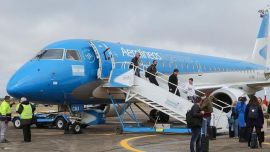The Club World Cup is still rolling on, but Argentine interest in events up in the United States is now strictly academic.
Boca and River were bounced out of the competition in quick succession last week, failing to get out of the group phase, leaving Brazil’s four participants to keep waving the flag for South America on the global stage. To those of us who watched the two Superclásico rivals toil through most of the first half of this year, their disappointment is hardly a surprise, even after spending at a rate unimaginable for most of their fellow teams in the Liga Profesional de Fútbol (and generally quite poorly).
River’s initial reaction has, predictably enough, been to break the bank once again, and Argentine football’s sacred honour code to boot.
Maxi Salas had already been in the Millonarios’ sights prior to the Club World Cup, but that interest has gone into overdrive in the wake of elimination. Such is their determination to land the hard-working Racing forward that River are willing to execute his release clause, a prohibitive figure and one which is earning them few friends across the league.
One may wonder just from where the controversy in this case is emanating, and it is a fair question. Such release clauses are legally required in the contract of any Argentine professional footballer and their specific execution is convoluted. To put it in simple terms, the buying club cannot pay the fee required to rescind a player’s bond with their current employers, as it is a private operation between the hiring party and the service provider. What River must do in practice is give Salas the money – an estimated 10 million euros, of which around eight will end up in Racing’s coffers once the forward’s former clubs and the inevitable taxman and AFA are duly compensated.
The issue here is that the clauses have long been understood to have merely symbolic value, an upper limit to negotiate for a player without forcing the seller’s hand. Actually executing the release is considered a breach of ethics and the unwritten code that binds club presidents and attracts bitter criticism, as seen in January when Estudiantes de la Plata paid out US$15 million dollars to ‘release’ Cristian Medina from Boca. That, however, was pushed by an ingénue, the mysterious Foster Gillett, who could be understood (if not forgiven, of course), for overlooking some of the subtleties of proper conduct in Argentine football. River and club president Jorge Brito cannot plead such ignorance.
“The best word is probably disappointment. Jorge Brito as president did not keep his word,” Racing supremo Diego Milito lamented to TyC Sports. “We would never do anything like that. I talked to [River] a month ago and they told me this situation was not going to happen, because of the pact in our football they wouldn’t execute the clause. Milito signed off with a barb for River’s coach: “I haven’t seen [Marcelo] Gallardo for more than a year. There is no dialogue. He’s not my friend. I understand he has a habit of maybe talking to players [from other clubs]... I wouldn’t do that.”
So what exactly are River getting for this latest massive cash outlay and the contempt of their peers? A physical, selfless forward whom Racing boss Gustavo Costas plucked out of Chile’s Palestino 18 months ago and honed him into one half, the engine, the legs, of La Academia’s lethal attacking partnership alongside Adrián Martínez. The issue is for all his talent and self-sacrifice Salas does not actually score many goals: 13 in 76 games for Racing, and just three in 25 so far in 2025. Given that goals are exactly what River are most lacking at the moment, the potential for disappointment seems high, particularly given the level of investment.
Still, desperate times and all that, and the Club World Cup held a mirror up to the Millonarios’ attacking deficiencies in a way that has stung them into action: they have to do something, even if it means vexing the rest of the league in the process.



















Comments